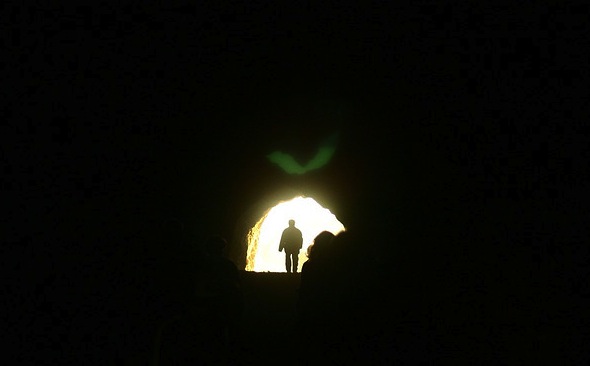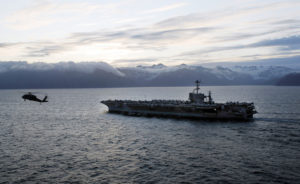Incinerating Iraq: How America’s Policies Sealed the Country’s Fate
The disintegration of Iraq is the result of U.S. policies that, since 2003, have been strikingly devoid of coherence or any real comprehension when it comes to the forces at play in the country or the region. 1
2
3
1
2
3
For Americans, it was like the news from nowhere. Years had passed since reporters bothered to head for the country we invaded and blew a hole through back in 2003, the country once known as Iraq that our occupation drove into a never-ending sectarian nightmare. In 2011, the last U.S. combat troops slipped out of the country, their heads “held high,” as President Obama proclaimed at the time, and Iraq ceased to be news for Americans.
So the headlines of recent weeks — Iraq Army collapses! Iraq’s second largest city falls to insurgents! Terrorist Caliphate established in Middle East! — couldn’t have seemed more shockingly out of the blue. Suddenly, reporters flooded back in, the Bush-era neocons who had planned and supported the invasion and occupation were writing op-eds as if it were yesterday, and Iraq was again the story of the moment as the post-post-mortems began to appear and commentators began asking: How in the world could this be happening?
Iraqis, of course, lacked the luxury of ignoring what had been going on in their land since 2011. For them, whether Sunnis or Shiites, the recent unraveling of the army, the spread of a series of revolts across the Sunni parts of Iraq, the advance of an extremist insurgency on the country’s capital, Baghdad, and the embattled nature of the autocratic government of Prime Minister Nouri al-Maliki were, if not predictable, at least expectable. And as the killings ratcheted up, caught in the middle were the vast majority of Iraqis, people who were neither fighters nor directly involved in the corrupt politics of their country, but found themselves, as always, caught in the vice grip of the violence again engulfing it.
An Iraqi friend I’ve known since 2003, living in a predominantly Sunni neighborhood in Baghdad, emailed me recently. He had made it through the sectarian bloodletting of 2006-2007 in which many of his Sunni compatriots were killed or driven from the capital, and this is the picture he painted of what life is now like for him, his wife, and their small children:
“All the dangers faced by Iraqis from the occupation — arrests, torture, car bombs, and sectarian violence — those killings have become like a toy in comparison to what we are facing these days. Fighting has spread in all directions from the north, east, and west of Baghdad. Much of the fighting is between the government and Sunni insurgents who have suffered a lot from the injustice of Maliki’s sectarian government.”
As for his daily life, he described it this way:
“As a result of this fighting, we can’t sleep because of our fear of the uncertainty of the situation, and because of the random arrests of innocent Sunni people. Each day I awake and find myself in a very hard and bad situation and now am trying to think of any way I can to leave here and save my family. Most of my neighbors left back when it was easier to leave. Now, we have both the U.S. and Iran helping the Iraqi government, and this will only make the fighting that is going on across Iraq much worse.
“Life in Iraq has become impossible, and even more dangerous, and there is now no way to leave here. To the north, west, and east of Baghdad there is fighting, and with so many groups of Shiite militias in the south, it is not safe for us to go there because of the sectarianism that was never here before the invasion. The price for bus tickets has become very expensive and they are all booked up for months. So many Iraqi families and I are trapped in the middle now.”
“Every day, the Iraqi army is raiding homes and arresting many innocent people. So many dead bodies are to be found at the Baghdad morgue in the days following the mass arrests in Sunni areas.”
He concluded his email on a stark note, reminiscent of the sorts of things I regularly heard when I was in Iraq covering the brutal results of the U.S. occupation. “Horror, fear, arbitrary arrests, indiscriminate bombing, killing, an uncertain future — this is the new democratic Iraq.”
And don’t for a second think that this summer it’s just Sunni communities who are living in fear. Claims of massacres and other atrocities being carried out by the Islamic State of Iraq and Syria (ISIS), the group spearheading the Sunni revolt across the northern and western parts of the country, abound along with well-documented accounts of their brutal tactics against Shiites.
In one incident, according to witnesses, ISIS forces kidnapped at least 40 Shia Turkmen, blew up three Shia mosques and another Shia shrine, and raided homes and farms in two Shia villages near the city of Mosul. And that’s just to start down a long list of horrors. Meanwhile, the sectarianism shredding the social fabric is being stoked further by the posting of images online that show at least 10 ancient Shiite shrines and mosques destroyed by ISIS fighters.
The Disintegration of Iraq
As for myself, I can’t claim to be surprised by the events of recent weeks. Back in March 2013, on a visit to the embattled Sunni city of Fallujah (twice besieged and largely destroyed by U.S. troops in the occupation years), I saw many signs of the genesis of what was to come. I was at one point on a stage there alongside half a dozen tribal and religious leaders from the area. Tens of thousands of enraged men, mostly young, filled the street below us, holding up signs expressing their anger toward U.S.-backed Prime Minister Maliki.
Having written about the myriad human rights abuses and violations Maliki’s regime was responsible for, I was intimately familiar with the way the bodies, dignity, and rights of much of the Sunni population in Fallujah’s province, al-Anbar, had been abused. That same month, I had, for instance, interviewed a woman who used the alias Heba al-Shamary and had just been released from an Iraqi prison after four grim years.
“I was tortured and raped repeatedly by the Iraqi security forces,” she told me. “I want to tell the world what I and other Iraqi women in prison have had to go through these last years. It has been a hell… I was raped over and over again. I was kicked and beaten and insulted and spit upon.” Heba, like so many Sunnis the Maliki regime decided to detain, torture, and sometimes execute, had been charged with “terrorism.”
Your support matters…Independent journalism is under threat and overshadowed by heavily funded mainstream media.
You can help level the playing field. Become a member.
Your tax-deductible contribution keeps us digging beneath the headlines to give you thought-provoking, investigative reporting and analysis that unearths what's really happening- without compromise.
Give today to support our courageous, independent journalists.





You need to be a supporter to comment.
There are currently no responses to this article.
Be the first to respond.